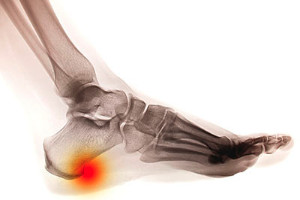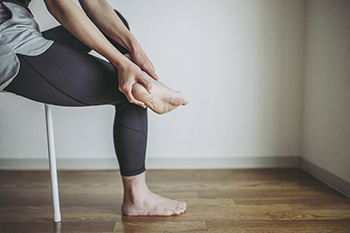What Is Plantar Fasciitis and Where Does It Occur?
The plantar fascia is the band of tissue on the soles of the feet that connect the front of the foot with the arch and the heel. When that tissue becomes inflamed due to stress or excessive stretching, plantar fasciitis can occur. Factors that can contribute to plantar fasciitis may include prolonged standing without proper footwear support, being overweight, having flat feet, high arches, or tight calf muscles. Pain from plantar fasciitis is often worse after sitting for a long period of time or in the morning, because the plantar fascia can contract while you are inactive or sleeping. If you have heel pain, it is suggested you make an appointment with a podiatrist who can examine you to make a proper diagnosis, and help treat whatever condition you may have using a variety of treatments and therapies.
Plantar fasciitis can be very painful and inconvenient. If you are experiencing heel pain or symptoms of plantar fasciitis, contact Dr. Steven Shlonsky from Louisville, Kentucky. Dr. Shlonsky can provide the care you need to keep you pain-free and on your feet.
What Is Plantar Fasciitis?
Plantar fasciitis is the inflammation of the thick band of tissue that runs along the bottom of your foot, known as the plantar fascia, and causes mild to severe heel pain.
What Causes Plantar Fasciitis?
- Excessive running
- Non-supportive shoes
- Overpronation
- Repeated stretching and tearing of the plantar fascia
How Can It Be Treated?
- Conservative measures – anti-inflammatories, ice packs, stretching exercises, physical therapy, orthotic devices
- Shockwave therapy – sound waves are sent to the affected area to facilitate healing and are usually used for chronic cases of plantar fasciitis
- Surgery – usually only used as a last resort when all else fails. The plantar fascia can be surgically detached from the heel
While very treatable, plantar fasciitis is definitely not something that should be ignored. Especially in severe cases, speaking to your doctor right away is highly recommended to avoid complications and severe heel pain. Your podiatrist can work with you to provide the appropriate treatment options tailored to your condition.
If you have any questions please feel free to contact our office located in Louisville, KY . We offer the newest diagnostic and treatment technologies for all your foot and ankle needs.
Read more about Plantar FasciitisSigns of a Heel Spur
 Heel spurs are bony growths that protrude from underneath the heel bone. While heel spurs often form alongside plantar fasciitis, they can also form on their own. Either way, heel spurs do have similar symptoms to plantar fasciitis. These symptoms include pain and tenderness under the heel (particularly while bearing weight), pain that is worse in the mornings, and worsening symptoms while running or walking. Heel spurs are generally only discovered through X-rays. They can be very painful, but they also may not be noticed at all. As the fat pad under the heel wears out, heel spurs tend to become more painful. Patients who are struggling with heel pain should consult with a podiatrist for a proper diagnosis of their pain.
Heel spurs are bony growths that protrude from underneath the heel bone. While heel spurs often form alongside plantar fasciitis, they can also form on their own. Either way, heel spurs do have similar symptoms to plantar fasciitis. These symptoms include pain and tenderness under the heel (particularly while bearing weight), pain that is worse in the mornings, and worsening symptoms while running or walking. Heel spurs are generally only discovered through X-rays. They can be very painful, but they also may not be noticed at all. As the fat pad under the heel wears out, heel spurs tend to become more painful. Patients who are struggling with heel pain should consult with a podiatrist for a proper diagnosis of their pain.
Heel spurs can be incredibly painful and sometimes may make you unable to participate in physical activities. To get medical care for your heel spurs, contact Dr. Steven Shlonsky from Louisville, Kentucky. Dr. Shlonsky will do everything possible to treat your condition.
Heels Spurs
Heel spurs are formed by calcium deposits on the back of the foot where the heel is. This can also be caused by small fragments of bone breaking off one section of the foot, attaching onto the back of the foot. Heel spurs can also be bone growth on the back of the foot and may grow in the direction of the arch of the foot.
Older individuals usually suffer from heel spurs and pain sometimes intensifies with age. One of the main condition's spurs are related to is plantar fasciitis.
Pain
The pain associated with spurs is often because of weight placed on the feet. When someone is walking, their entire weight is concentrated on the feet. Bone spurs then have the tendency to affect other bones and tissues around the foot. As the pain continues, the feet will become tender and sensitive over time.
Treatments
There are many ways to treat heel spurs. If one is suffering from heel spurs in conjunction with pain, there are several methods for healing. Medication, surgery, and herbal care are some options.
If you have any questions feel free to contact our office located in Louisville, KY . We offer the latest in diagnostic and treatment technology to meet your needs.
Risk Factors for Gout
Gout is a type of arthritis that is caused by excess uric acid in the bloodstream crystallizing and lodging in the joints. It frequently affects the joints of the big toes, which causes sudden and intense pain, swelling, redness, warmth, and stiffness. Certain people are more at risk of developing gout than others. People who have medical conditions such as diabetes, kidney disease, high blood pressure, high cholesterol, and osteoarthritis should be vigilant of any gout symptoms. Gout is also associated with obesity and with diets high in purines, which are found in seafood and red meat. Certain medications can increase uric acid levels in the body, which may lead to gout. Men are more likely to develop gout prior to the age of 60, while both men and women aged 60 and over have an equal risk of developing gout. Finally, gout may be more likely in people with a family history of this condition. If you have gout or are at risk for it, please consult with a podiatrist, who can help you get the right treatments and teach you strategies to prevent gout.
Gout is a foot condition that requires certain treatment and care. If you are seeking treatment, contact Dr. Steven Shlonsky from Louisville, Kentucky. Dr. Shlonsky will treat your foot and ankle needs.
What Is Gout?
Gout is a type of arthritis caused by a buildup of uric acid in the bloodstream. It often develops in the foot, especially the big toe area, although it can manifest in other parts of the body as well. Gout can make walking and standing very painful and is especially common in diabetics and the obese.
People typically get gout because of a poor diet. Genetic predisposition is also a factor. The children of parents who have had gout frequently have a chance of developing it themselves.
Gout can easily be identified by redness and inflammation of the big toe and the surrounding areas of the foot. Other symptoms include extreme fatigue, joint pain, and running high fevers. Sometimes corticosteroid drugs can be prescribed to treat gout, but the best way to combat this disease is to get more exercise and eat a better diet.
If you have any questions please feel free to contact our office located in Louisville, KY . We offer the newest diagnostic and treatment technologies for all your foot and ankle needs.
What Is Infectious Arthritis?
 Infectious arthritis is a sudden and painful form of arthritis caused by bacterial, viral, or fungal infections. This type of arthritis typically only affects one joint and can be caused by an infection spreading from one part of your body to the joint or joint lining, or by an infection-causing germ entering the body through open wounds, injections, or surgery. The symptoms of infectious arthritis include intense swelling, pain, fever, and chills. Although infectious arthritis usually affects the knees, it can also attack hips, wrists, and ankles. If you have symptoms of infectious arthritis in your ankle, a podiatrist may be able to help. For more information about the different types of arthritis, the effects of arthritis on your feet, and how to care for arthritic feet and ankles, please consult with a podiatrist.
Infectious arthritis is a sudden and painful form of arthritis caused by bacterial, viral, or fungal infections. This type of arthritis typically only affects one joint and can be caused by an infection spreading from one part of your body to the joint or joint lining, or by an infection-causing germ entering the body through open wounds, injections, or surgery. The symptoms of infectious arthritis include intense swelling, pain, fever, and chills. Although infectious arthritis usually affects the knees, it can also attack hips, wrists, and ankles. If you have symptoms of infectious arthritis in your ankle, a podiatrist may be able to help. For more information about the different types of arthritis, the effects of arthritis on your feet, and how to care for arthritic feet and ankles, please consult with a podiatrist.
Arthritis can be a difficult condition to live with. If you are seeking treatment, contact Dr. Steven Shlonsky from Louisville, Kentucky. Dr. Shlonsky can provide the care you need to keep you pain-free and on your feet.
Arthritic Foot Care
Arthritis is a joint disorder that involves the inflammation of different joints in your body, such as those in your feet. Arthritis is often caused by a degenerative joint disease and causes mild to severe pain in all affected areas. In addition to this, swelling and stiffness in the affected joints can also be a common symptom of arthritis.
In many cases, wearing ill-fitting shoes can worsen the effects and pain of arthritis. Wearing shoes that have a lower heel and extra room can help your feet feel more comfortable. In cases of rheumatoid arthritis, the arch in your foot may become problematic. Buying shoes with proper arch support that contour to your feet can help immensely.
Alleviating Arthritic Pain
- Exercises that stretch the foot can prevent further pain and injury and increase mobility
- Most of the pain can be alleviated with anti-inflammatory drugs, heat, and topical medications
- Massages can help temporarily alleviate pain.
It is best to see your doctor for the treatment that is right for your needs and symptoms. Conditions vary, and a podiatrist can help you determine the right method of care for your feet.
If you have any questions, please feel free to contact our office located in Louisville, KY . We offer the newest diagnostic tools and technology to treat your foot and ankle needs.










